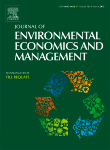
May 2015
The paper “The Second Dividend and the demographic structure” by Frédéric Gonand and Pierre-André Jouvet, is published in the Journal of Environmental Economics and Management.
Abstract:
The demographic structure of a country influences economic activity. The “second dividend” modifies growth. Accordingly, in general equilibrium, the second dividend and the demographic structure are interrelated. This paper aims at assessing empirically the “second dividend” in a dynamic, empirical and intertemporal setting that allows for measuring its impact on growth, its intergenerational redistributive effects, and its interaction with the demographic structure. The paper uses a general equilibrium model with overlapping generations, an energy module and a public finance module that distinguishes between non-ageing-related public spending and a pension regime. Policy scenarios compare the consequences of different scenarios of recycling a carbon tax through lower proportional income taxes rather than higher public lump-sum expenditures. They are computed for two countries with different demographics (France and Germany). Results suggest that the magnitude of the “second dividend” is significantly related with the demographic structure. The more concentrated the demographic structure on cohorts with higher income and saving rate, the stronger the effect on capital supply of the second dividend. The second dividend weighs on the welfare of relatively aged working cohorts. It fosters the wellbeing of young working cohorts and of future generations. The more concentrated the demographic structure on aged working cohorts, the higher the intergenerational redistributive effects of the second dividend.
You can buy this paper on ScienceDirect.com
